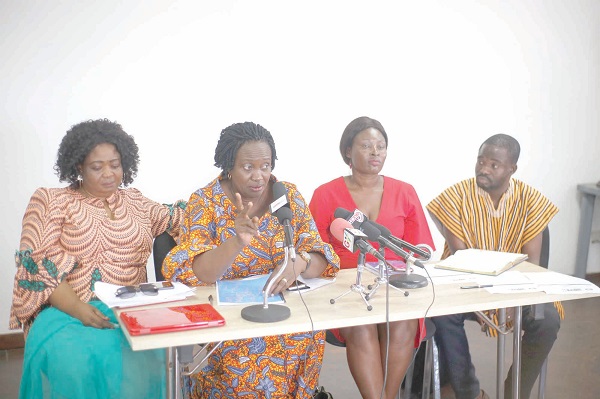
Media campaign for Affirmative Action Bill launched
The Friedrich Ebert Foundation Ghana (FES), in collaboration with the International Federation of Women Lawyers (FIDA-Ghana), has launched a media advocacy campaign for the passage of the Affirmative Action Bill.
When passed into law, the Affirmative Action Bill will require the government to ensure equitable gender representation at all levels of governance and decision making in the country.
Advertisement
Women’s representation in the public service, ministerial positions, independent constitutional bodies, boards of state institutions and political parties are expected to improve with the passage of the law, which also seeks to address other socio-economic imbalances.
Advocates
In her address, the Programmes Coordinator for FES, Ms Ernestina Ofoe, said it was imperative for the media to be partners in “the campaign which seeks to put pressure on Parliament, and for that matter, government, to give the needed attention for the passage of the bill.”
“We believe the media can play a major role in ensuring that this bill is passed into law.
We want you to take this engagement to another level. Do not see the passage of the bill as a job for some group of people, as a job for some group of women or some group of men.
The bill is about gender engineering in this country and it concerns everybody.
Wherever you find yourself, in whichever corner you are, advocate the passage of the bill, because we have worked hard enough and we deserve this bill as Ghanaians to correct the imbalance in the system,” she added.
Bill misconstrued
An Executive Member of FIDA-Ghana, Mrs Irene Aborchie-Nyahe, said the Affirmative Action Bill had been misconstrued as a bill which would favour women only.
“The bill is not only about women. It is about the development of the country. If we are 100 people in this country and only 40 per cent is working, how will the country develop? It is not just about women. It is about the development of the country.
Sometimes when you give it the women’s tag, that’s when the discrimination comes in,” she said.
She further noted that the bill was a right and not a privilege, saying “we don’t have to be at the background and beg for space. It is not a privilege. It is a right.”
She pointed out that the 1992 Constitution “clearly gives women the right to fully participate in the mainstream economic development of Ghana.”
“In many portions of this Constitution, you will find direct and indirect provisions for affirmative action. Why are we still fighting for the passage of the bill into a law? If this is a constitutional provision, are we not violating the Constitution by not passing this bill?” she asked.
Legislative process
For her part, former Chairperson of the Affirmative Action Bill Technical Committee, Mrs Joana Opare, decried the delay in the passage of the bill, as it is yet to go through the final legislative process, after it was first drafted in 2011.
In her opinion, the reason for the delay in the passage of the bill into law could be because of the misrepresentation of the bill.
“We have seen that governments upon governments come and they interpret the bill as they like, so I was happy when the President came and said I will pass it into law.
He has said it. The bill has gone to Parliament and come back before. What is preventing us from ensuring that this bill gets there before next year’s election?” she queried.
She urged the media to trumpet the need for the bill to be passed into law, since “women’s equal participation in decision making is not only a demand for simple justice or democracy but also a necessary condition for women’s interest to be taken into account because we are part of society.”
She recalled that Ghana had in several ways rolled out affirmative action laws, such as the Northern Education Policy under the Convention People’s Party (CPP) government and the election of 10 women by the National Assembly to fill specially created seats in Parliament in 1960, while quotas were instituted for some appointed members of district assemblies in 1998.
Extreme advocacy
Award-winning journalist Manasseh Azure Awuni also urged the media to support campaigns for the passage of the Affirmative Action Bill, saying that could be achieved through deliberate efforts to push for that agenda.
“No matter how long it takes, if we keep pushing, we are likely to get some action; but let’s avoid extreme advocacy. Extremism in every aspect of life can be dangerous and counter-productive to the message,” he advised.



